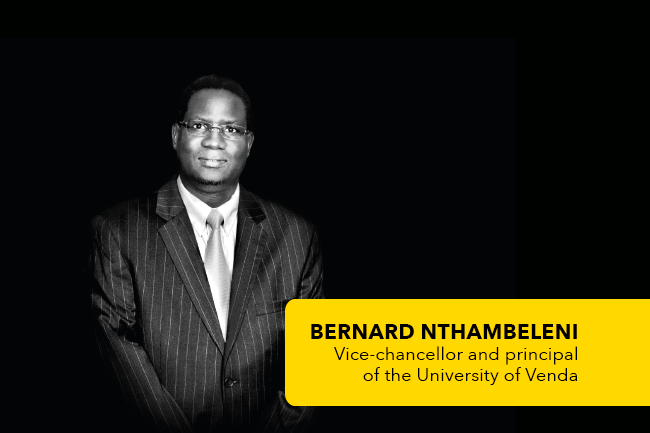There are a number of unique advantages to being a rural-based university, particularly those positioned to service as vast a region as SADC. For the students there is the promise of a close-knit campus life, strong support from surrounding communities, a generally safer environment and stimulating activities that are almost entirely focused on university life and self- and community-development.
From the University of Venda’s (Univen) perspective, located as it is in the scenic Vhembe district of Limpopo, the benefits of being rurally based at the northern tip of South Africa means it attracts students not only from in-country but also from as far afield as Ghana, Nigeria, Kenya, the DRC, Zambia, Cameroon and Gabon, as well as from neighbouring Zimbabwe, Botswana, Mozambique, and land-locked Lesotho and Eswatini.
This has translated into the university prioritising its curriculum to address the needs of African nations, particularly SADC states. Univen vice-chancellor and principal Bernard Nthambeleni explains that the university’s eight schools – environmental sciences; health sciences; agriculture; education; human and social sciences; management sciences; law; and mathematical and natural sciences – are focused on contributing significantly to human resources and development needs.
‘I highlight our Centre for Rural Development, which encourages research that is aligned to our niche in agriculture and rural development, and the respective role we must all play to ensure positive change,’ he says. ‘This also plays out in our school of human and social sciences, which has direct links with art communities and similar development entities in the district, with students engaging in activities directed at empowering communities through a collective spirit of co-operation.’
This spirit directly embodies the institution’s motto – ‘We create future leaders’ – because, as Nthambeleni says, it’s a reminder that we should all make a valuable contribution, whether that be leading academic research, teaching or learning. ‘Universities can no longer simply be about providing a tertiary education when there are so many needs on the continent,’ he says. ‘We motivate our students to take leadership roles across all aspects of life, or to be change-makers. Other than making our curriculum relevant to the current needs of surrounding communities, for example, we are re-looking deeper into the base of the curriculum to ensure that graduates are able to initiate innovative ways to create jobs and deal with unemployment challenges.’
Nthambeleni highlights Enactus, which he explains is a Univen student structure whereby entrepreneurship mentorship and business-skills training are provided to locals. ‘Enactus helps potential entrepreneurs explore funding and innovative thinking.’ In addition, the university has created the Univen Innovative Growth Company, which similarly provides training courses to locals.
Other centres of excellence – within the school of agriculture and the Institute for Rural Development – work to help neighbouring farming communities and to maintain the strong stakeholder relationships Univen has with local traditional leaders. ‘We are seen as a resourceful campus in the region and this, in my view, is how universities should be operated; to enhance the environment and its people,’ according to Nthambeleni.
‘As an institute of higher learning we are equally concerned about issues of conservation as much as we are about upholding human rights, and this explains our core values of accountability, transparency, integrity, respect, diversity, quality, excellence, social responsibility, community engagement and ubuntu, which has its roots in humanity.’
Over the past five years, Univen has concentrated on expanding its infrastructure, presenting modern new buildings that incorporate lecture halls, administration offices and student residences. ‘The latter is always a priority in order to continue to provide peaceful and secure accommodation for our students,’ says Nthambeleni. ‘Upgrades like this have made it possible for us to grow our numbers from as little as 300 students in the early 1980s to the current 16 759 today.
‘Last year we added two additional staff complexes, which allows us to recruit and attract better-qualified academic staff members from around the globe. In line with our academic development plans we are also considering the introduction of other priority programmes that respond to the challenges of the Fourth Industrial Revolution.’
Univen is also developing a reputation for the quality of its graduates. Elelwani Muthivhi, who holds a bachelor’s degree in psychology and a Master of Arts from Univen, is hailed as South Africa’s first psychological autopsy investigator, and has been certified by the Washington DC-based American Association of Suicidology, at the Chicago School of Professional Psychology.
Women are doing particularly well at Univen, making up the majority of graduates (1 830) at the May 2019 graduation. This year alone, in addition to diplomas and certificates, 65 doctoral, 144 master’s, 306 honour’s and 3 252 bachelor’s degrees have been awarded.
As Nthambeleni explains, with the current five-year strategic plan under review, new development goals, known as ‘thrusts’ will be ‘guiding our objectives for the university’s future, aligned to ensure there is a balance between our throughput and priority-areas skills requirements of the country’.



